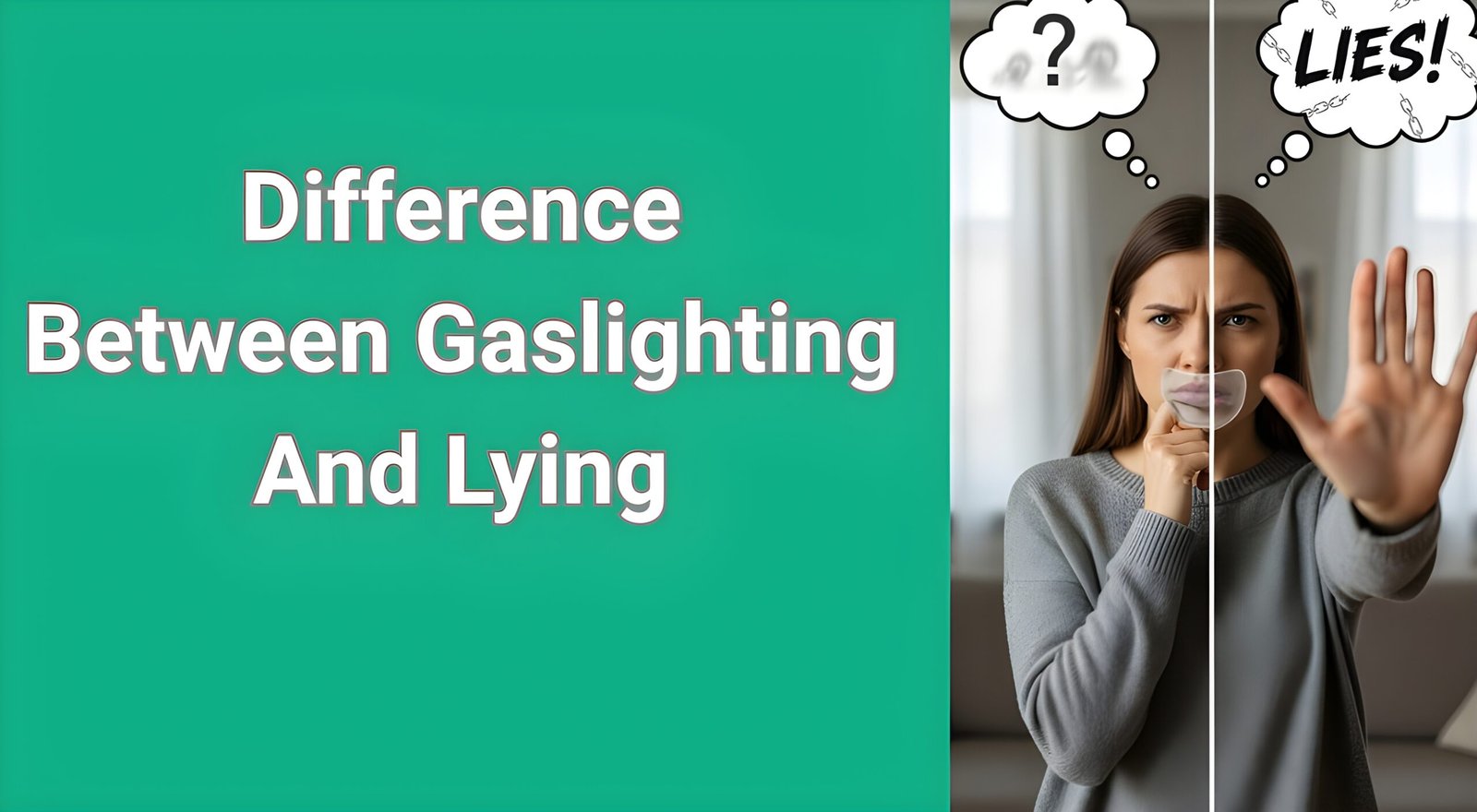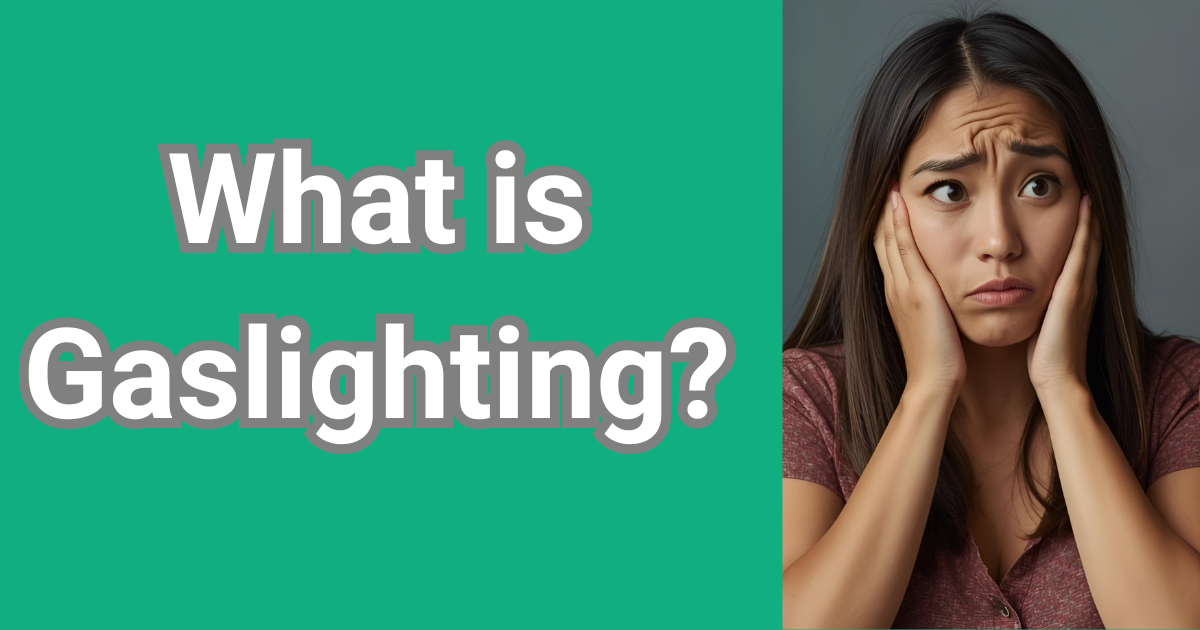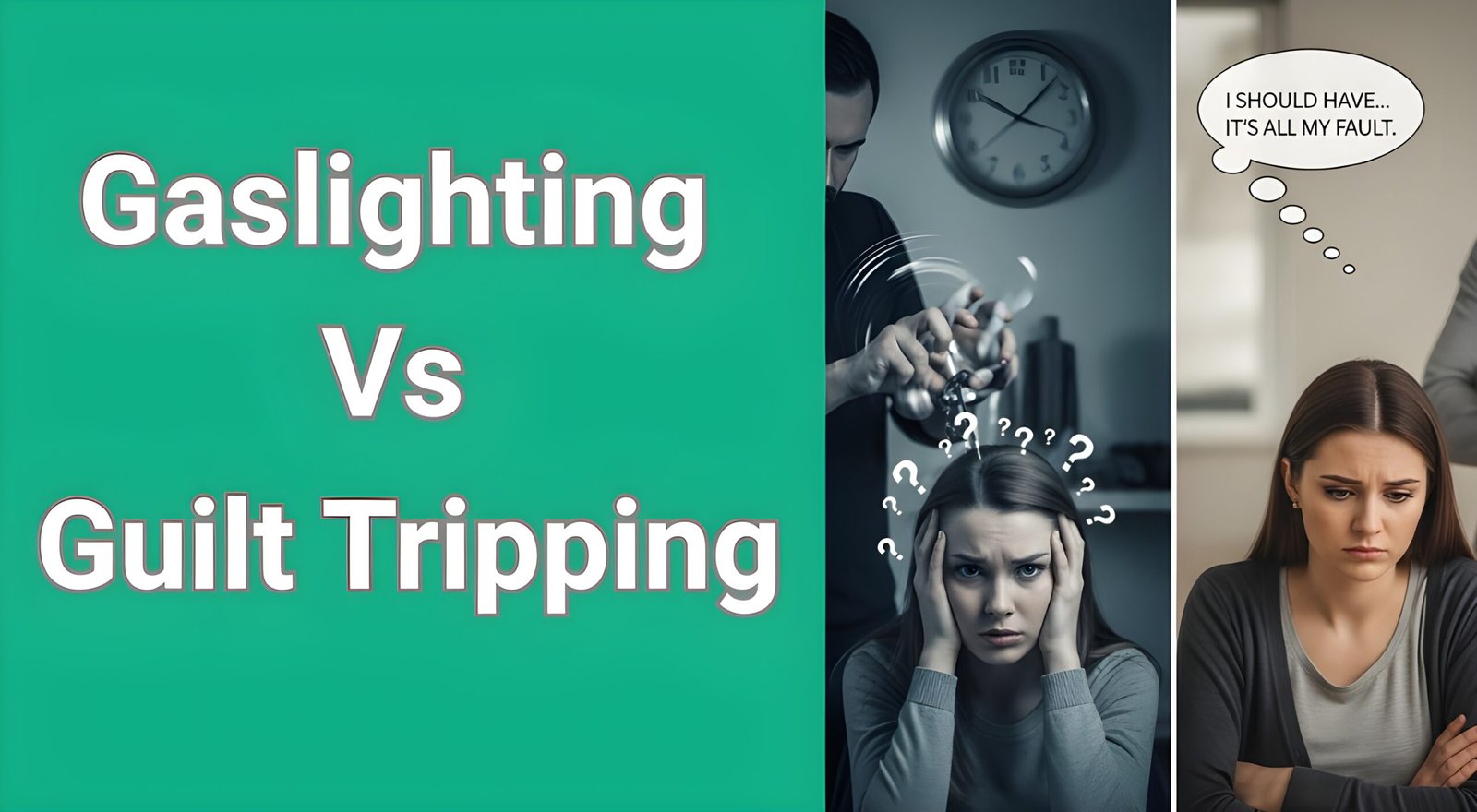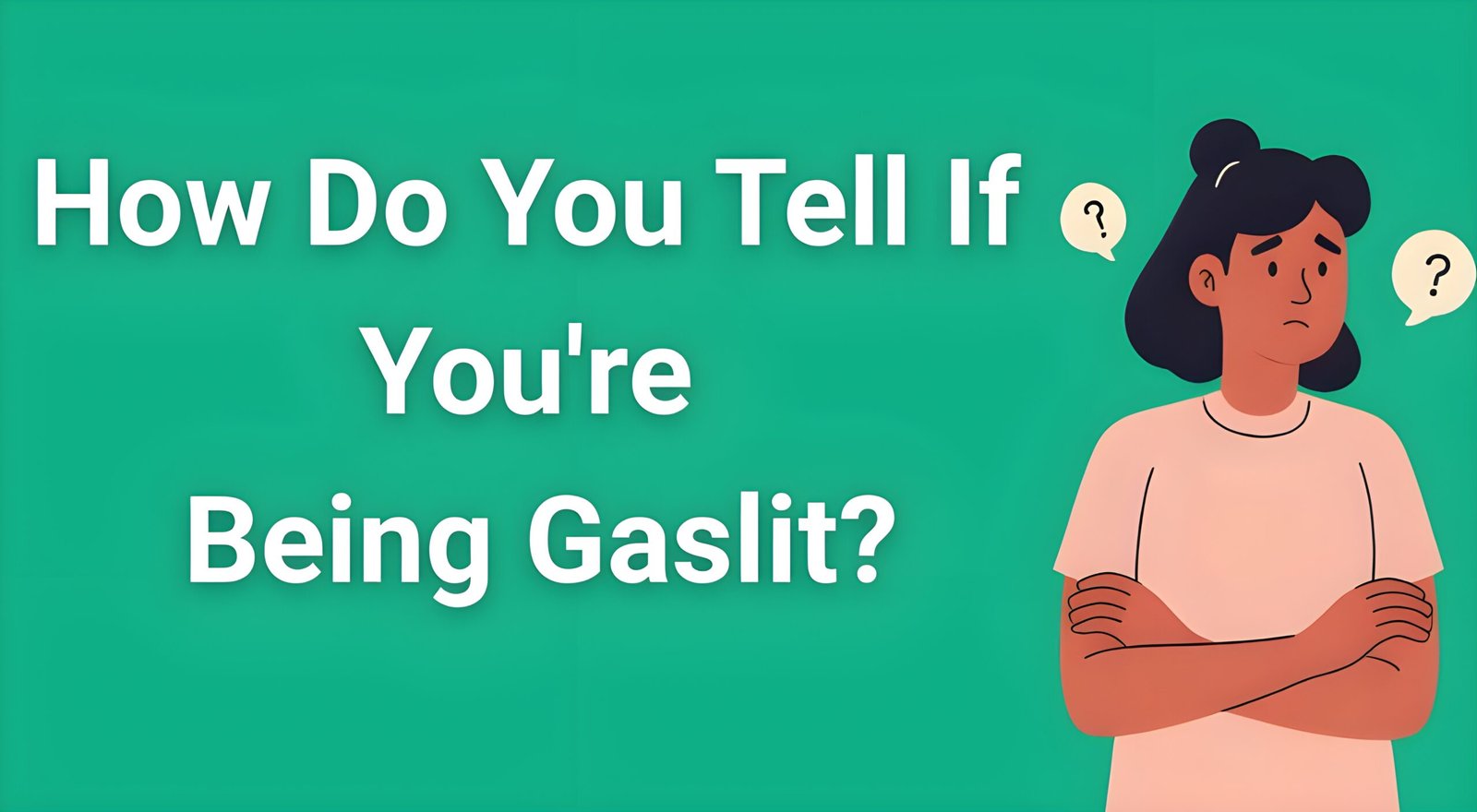If someone in your life has lied to you, you probably felt deceived and angry. But if someone has been gaslighting you, you might find yourself questioning your own memory and wondering if you’re losing your mind. Understanding the difference between gaslighting and lying isn’t just academic—it’s essential for protecting your mental health and knowing how to respond appropriately to manipulative behavior.
- Understanding the Core Difference Between Gaslighting and Lying
- The 7 Critical Distinctions You Must Recognize
- Real-World Examples: Difference Between Gaslighting and Lying
- Why Smart People Fall for Gaslighting But Not Simple Lies
- The Dangerous Progression: When Lying Becomes Gaslighting
- How to Respond: Different Situations Require Different Strategies
- When Professional Help Becomes Essential
- Protecting Yourself: Prevention Strategies
- The Bottom Line: Why This Distinction Can Save Your Mental Health
- Frequently Asked Questions Difference Between Gaslighting And Lying
In my seven years specializing in narcissistic abuse recovery and working with survivors, I’ve worked with countless survivors who initially dismissed devastating gaslighting as “just lying.” This misunderstanding can be dangerous because these behaviors require completely different responses and have vastly different impacts on your psychological wellbeing.
Let me walk you through the seven critical distinctions that will help you recognize what you’re truly dealing with and respond in a way that protects your sanity and safety.
Understanding the Core Difference Between Gaslighting and Lying
Think of lying as hiding the truth about specific facts or events. Gaslighting, on the other hand, is a systematic attack on your ability to trust your own perceptions of reality.
When someone lies to you, they’re typically trying to avoid consequences, spare your feelings, or protect themselves from embarrassment. The lie itself is the problem—they told you something untrue about a specific situation.
When someone gaslights you, they’re not just lying about facts. They’re deliberately trying to make you doubt your memory, your judgment, and your sanity. The goal isn’t just to deceive you about one thing—it’s to gain psychological control over you by undermining your confidence in your own mind.
This distinction matters because gaslighting represents a far more serious form of psychological abuse that can have lasting effects on your mental health and self-trust.
The 7 Critical Distinctions You Must Recognize
1. Intent: Self-Protection vs. Mind Control
Lying Intent: People usually lie to protect themselves from consequences, avoid hurting someone’s feelings, or dodge uncomfortable situations. The focus is on avoiding immediate problems.
Example: “I was stuck in traffic” (when they actually left late)
Gaslighting Intent: The gaslighter specifically aims to make you question your perception of reality to gain psychological power and control over you. They want you to become dependent on their version of events.
Example: “You’re always so paranoid about time. I told you I’d be here around 7, not exactly at 7. You’re remembering it wrong again.”
2. Response When Confronted: Defensive vs. Attacking Your Sanity
Lying Response: When caught in a lie, most people become defensive, embarrassed, or may eventually admit the truth. They might apologize or try to justify their behavior.
Typical response: “Okay, you’re right. I should have just told you I was running late.”
Gaslighting Response: When confronted, gaslighters attack your mental state rather than addressing the issue. They make you the problem, not their behavior.
Typical response: “You’re being way too sensitive. This is exactly why people don’t like being around you—you make everything into a big drama.”
3. Impact on Your Reality: Information vs. Self-Doubt
Lying Impact: You might feel deceived about specific information, but you still trust your own memory and perceptions about what happened.
Your thoughts: “They lied about where they were, but I know what they told me originally.”
Difference Between Gaslighting and Lying Impact: You begin to doubt your own memory, judgment, and sanity. You start questioning things you were previously certain about.
Your thoughts: “Maybe I did misremember what they said. Am I being too sensitive? Maybe I am making things up.”
4. Pattern: Isolated Incidents vs. Systematic Campaign
Lying Pattern: Lies are often isolated incidents related to specific situations. Most people don’t lie consistently about everything.
Gaslighting Pattern: This represents a consistent, escalating pattern of reality manipulation. It’s not about individual lies—it’s about systematically breaking down your confidence in your own perceptions.
5. Power Dynamics: Equality vs. Control Seeking
Lying Power Dynamic: The relationship may remain relatively equal. The liar isn’t necessarily trying to dominate or control you—just to avoid specific consequences.
Gaslighting Power Dynamic: There’s always an underlying attempt to establish dominance and control. The gaslighter wants you to become psychologically dependent on them.
6. Your Emotional State: Anger vs. Confusion and Self-Doubt
Lying Emotional Impact: You typically feel angry, disappointed, or hurt about being deceived, but you maintain confidence in your own perceptions.
Gaslighting Emotional Impact: You feel confused, anxious, and begin to doubt yourself. You might find yourself constantly second-guessing your own memory and judgment.
7. Recovery: Trust Issues vs. Reality Reconstruction
Lying Recovery: You need to decide whether you can trust this person again, but your sense of reality remains intact.
Gaslighting Recovery: You need to rebuild your trust in your own perceptions, memory, and judgment—a much more complex psychological process.
Real-World Examples: Difference Between Gaslighting and Lying
Let me show you how the same situation can involve either lying or gaslighting, depending on the intent and approach.
Scenario: Money Missing from Joint Account
Lying Example: You: “There’s $500 missing from our account. Where did it go?” Them: “I don’t know. Maybe there was a bank error?” Later you discover they spent it on something they didn’t want to tell you about.
Gaslighting Example: You: “There’s $500 missing from our account. Where did it go?” Them: “You’re always obsessing over money. We never had $500 more than we have now. You must have miscalculated again. This is exactly like when you thought I spent money last month, but you were completely wrong. Maybe you should see a doctor about your memory problems.”
Scenario: Plans That Were Made
Lying Example: You: “We agreed to go to my parents’ house this weekend.” Them: “Something came up at work, and I can’t make it.” (They actually just don’t want to go)
Gaslighting Example: You: “We agreed to go to my parents’ house this weekend.” Them: “We never made those plans. You’re always making up conversations that never happened. Your parents even think you imagine things. Maybe you dreamed we talked about it. You really need to start writing things down because your memory is getting worse.”
Notice how the gaslighter doesn’t just avoid the commitment—they attack your mental state and try to convince you the conversation never happened. Guilt and Gaslighting are also different.
Why Smart People Fall for Gaslighting But Not Simple Lies
You might wonder how intelligent, capable people can fall victim to gaslighting when they’d easily recognize a simple lie. The answer lies in how gaslighting operates.
Gaslighting starts small and escalates gradually. A gaslighter begins with minor reality distortions that seem almost reasonable to question. Over time, as your confidence erodes, they introduce larger distortions. By the time the manipulation becomes severe, your ability to trust your own perceptions has already been compromised.
Additionally, gaslighting often occurs within close relationships where you want to trust the other person. When someone you love consistently tells you that your memory is faulty or your perceptions are wrong, you naturally begin to doubt yourself rather than doubt them.
The Dangerous Progression: When Lying Becomes Gaslighting
Sometimes what starts as simple lying can evolve into gaslighting. Here’s how this dangerous progression typically unfolds:
Stage 1: Simple Lies They lie about specific things but don’t challenge your memory or perceptions.
Stage 2: Defensive Lying When caught, they become more creative with their lies but still don’t attack your mental state.
Stage 3: Reality Questioning They begin to suggest you might be wrong about what you remember or perceived.
Stage 4: Full Gaslighting They systematically attack your memory, judgment, and sanity while positioning themselves as the reliable source of truth.
How to Respond: Different Situations Require Different Strategies
Responding to Lying
- Address the specific lie directly
- Express how the dishonesty affects your trust
- Set clear consequences for continued lying
- Decide if the relationship can be rebuilt with honesty
Responding to Gaslighting
- Document conversations and events to maintain reality checks
- Seek outside perspectives from trusted friends or family
- Avoid engaging in arguments about “facts” with the gaslighter
- Consider the relationship’s safety for your mental health
- If leaving immediately isn’t safe or possible, focus on protecting yourself while you’re still in the situation
- Seek professional support to rebuild your self-trust
If you’re experiencing consistent gaslighting, you might benefit from tools specifically designed to help you regain clarity about your experiences. Many survivors find that our Narcissistic Abuse Clarity Report helps them understand the patterns they’re experiencing and gain the validation they need to move forward.
When Professional Help Becomes Essential
The difference between gaslighting and lying also determines when you need professional support. Simple lying in relationships might be addressed through better communication or couples counseling.
Gaslighting, however, typically requires individual therapy focused on rebuilding your sense of reality and self-trust. The psychological impact of sustained gaslighting can include:
- Anxiety and depression
- Loss of confidence in your own judgment
- Difficulty making decisions
- Hypervigilance about your own mental state
- Social isolation due to self-doubt
In my experience working with abuse survivors, recovery from gaslighting requires both understanding what happened to you and actively rebuilding your trust in your own perceptions. This process often takes time and benefits from professional guidance.
For those who need structured support in this recovery process, our 30 Day Trauma Bond Recovery Workbook provides the daily tools necessary for rebuilding your psychological foundation after manipulative relationships.
Protecting Yourself: Prevention Strategies
Early Warning Signs the Relationship is Shifting from Lying to Gaslighting
Understanding the complete picture of gaslighting signs in relationships helps you recognize when simple dishonesty is escalating into psychological manipulation:
- They start questioning your memory about conversations
- They suggest you’re “too sensitive” when you address their behavior
- They involve others to confirm their version of events
- You find yourself constantly second-guessing your own recollections
- They respond to confrontation by attacking your mental state rather than addressing their behavior
Building Your Reality-Checking System
- Keep written records of important conversations
- Maintain relationships with people who validate your experiences
- Trust your gut when something feels wrong
- Practice self-compassion when you make normal human mistakes
- Remember that questioning your own sanity is not a normal response to relationship conflicts
Frequently Asked Questions About
The Bottom Line: Why This Distinction Can Save Your Mental Health
Understanding the difference between gaslighting and lying isn’t just about labeling behavior correctly—it’s about protecting your psychological wellbeing and responding appropriately to different types of manipulation.
Simple lying damages trust in relationships, but gaslighting damages your trust in yourself. When you recognize gaslighting for what it is, you can take the necessary steps to protect your mental health rather than trying to “improve communication” with someone who is deliberately undermining your sanity.
If you’re questioning whether you’re experiencing gaslighting or just dealing with a dishonest person, that questioning itself might be your answer. People who are simply lied to rarely doubt their own mental state—they doubt the other person’s honesty.
You deserve relationships built on respect and honesty, not psychological manipulation. When you can clearly identify the difference between gaslighting and lying, you empower yourself to respond in ways that protect both your relationships and your mental health.
Sometimes the first step in protecting yourself is simply getting clarity about what you’re actually experiencing. For those who need guidance in recognizing these patterns, professional assessment tools can provide the validation and direction necessary for moving forward safely.
Frequently Asked Questions Difference Between Gaslighting And Lying
While the impact is the same, true gaslighting involves intentional manipulation to gain control. Unintentional reality distortion is usually defensiveness or poor communication skills, not gaslighting.
Recovery time varies, but most survivors need several months to rebuild their self-trust with proper support. The process involves both understanding what happened and actively practicing self-validation.
Yes, gaslighting always involves lies, but not all lies are gaslighting. The key is whether the lies are designed to make you doubt your own reality and mental state.
Absolutely. Workplace gaslighting involves similar reality manipulation tactics, often to undermine your professional confidence and competence rather than personal relationships.
If you feel angry or hurt about being lied to but still trust your own perceptions and memory, you’re likely dealing with simple dishonesty, not gaslighting. Gaslighting makes you doubt yourself, not just the other person.





